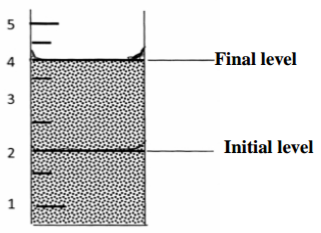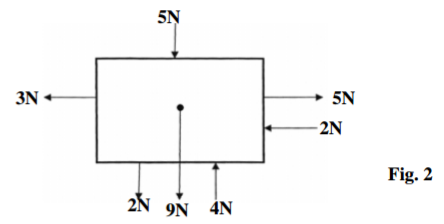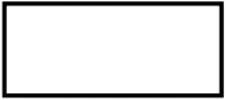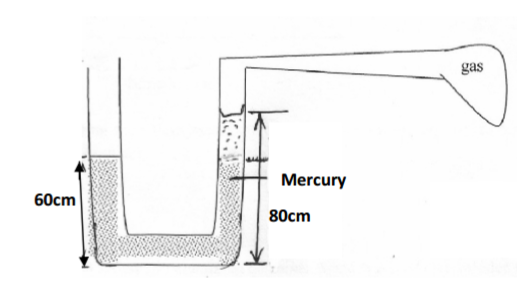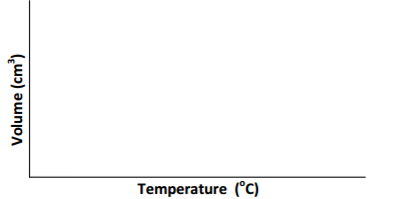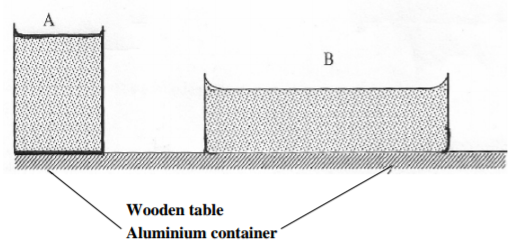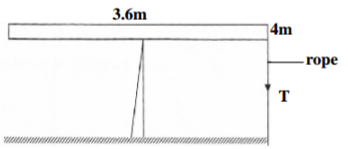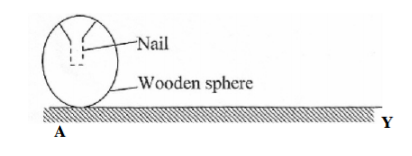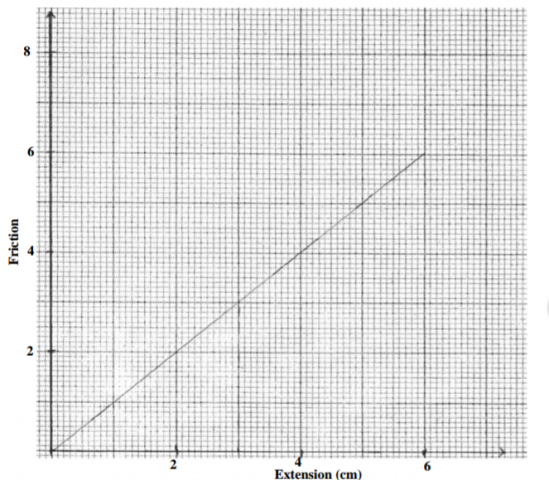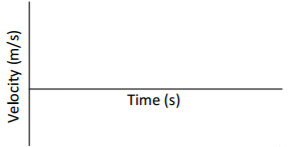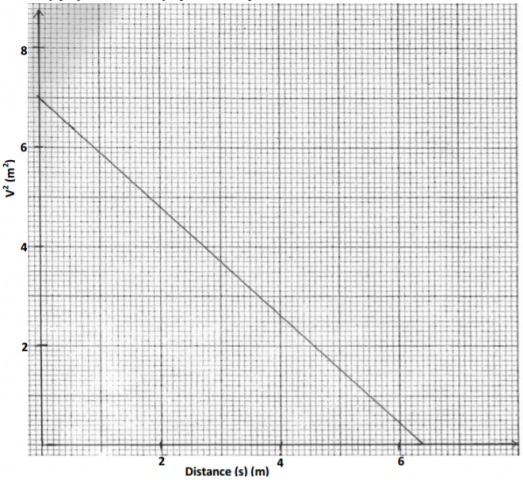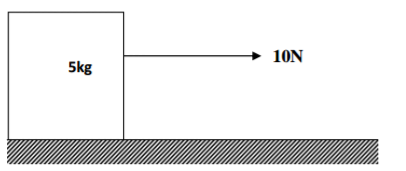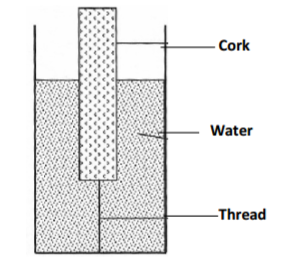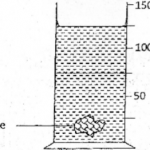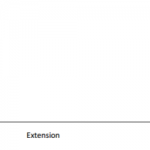KNEC KCSE Physics Paper 2 – 2014 Homa-Bay Mock
2014 Homa-Bay Mock
Physics Paper 1
SECTION A (25 Marks)
Answer all questions
A packer pen was accidentally dropped into a measuring cylinder containing water. The volume of
water moved from initial level to form the level as shown below;-
If the mass of the parker pen is 0.012kg determine its density.
2 marks
The figure 1 below shows some forces acting on object.
On the figure below draw the resultant force acting on the object.
2 marks
Figure two below shows the apparatus used to examine the pressure of a gas.
Taking density of mercury to be 13,600kg/m3 and standard atmospheric pressure 100,000N/m2. Calculate gas pressure.
3 marks
Explain why it is possible to compress gases but not solids or liquids.
3 marks
(a) One the axis provided, sketch a graph of volume against temperature of water from 0o to 20oC.
(2mks)
(b)During anomalous expansion of water, heat transfer is limited to conduction and radiation
only explain (1mk)
3 marks
Figure 3 shows two aluminium container A and B placed on a wooden table containers A and B have
equal volume of hot water initially at the same temperature.
Explain why water in B cools faster than water in A.
2 marks
A uniform rod of length 4m and mass 4 kg is pivoted at 3.6m mark. The rod is held horizontally with
a vertical rope at 4m mark as shown below
Calculate tension T in the rope (Take g=10N/kg)
3 marks
(a) Define centre of gravity of a body (1mk)
(b) The figure below shows a wooden sphere with a nail hammered into it at point A as shown below
The sphere is rolled on a horizontal ground and comes to rest after some time at point Y. Draw the
sphere after it comes the rest at point Y and explain (2mks)
3 marks
Define the term Heat capacity.
1 marks
A girl heats 5kg of water to a temperature of 80oC. When she adds m kg of water at 15oC the mixture
attains a temperature of 40oC. Determine the value of m.
2 marks
State the difference between an ideal and real gas.
2 marks
Define absolute zero temperature in terms of kinetic energy
1 marks
(a) In an experiment to estimate the diameter of an oil molecule, an oil drop of diameter 0.06cm
spread over a circular patch whose diameter is 20cm. Determine
(i) The volume of the oil drop (2mks)
(ii) The area of the patch covered by oil (2mks)
(iii) The diameter of the oil molecule (1mk)
(b) State any one assumption made in (iii) above
(c) The figure below shows parts A and B of a glass tube
(i) State the part of the tube in which the pressure will be lowest when air is blown through the
tube to from A to B (1mk)
(ii) Compare the velocity of air at A and at B. (1mk)
(iii) What is the relationship between the velocity of the air and its pressure at any point along
the tube AB. (1mk)
(d) Water flows a horizontal pipe of cross-section area 35cm2 and constriction of cross section
area 5cm2. If the speed of water at the constriction is 2m/s, Calculate
(i) Continuity constant in SI unit (1mk)
(ii) The speed in the wide section (2mks)
11 marks
(a) State Hooke’s law (1mk)
(b) The graph provided is of force (y-axis) against extension.
(i) From the graph determine the work done in stretching spring by 3cm (3mks)
(ii) Use the graph to determine the spring constant. Give your answer in SI units (3mks)
(iii) State two factors that affect the spring constant (2mks)
9 marks
(a) On the grid provided, sketch a velocity time graph of a bouncing ball dropped from rest
at a height of 2.5cm (2mks)
(b) The graph provided below shows a graph of V2 against the distance S travelled by a
body projected vertically upwards at a point on the earth surface.
(i) From the graph calculate the gravitational acceleration of the earth (g) at that point (3mks)
(ii)Using the graph determine
(I) The initial velocity of the body (3mks)
(II) The maximum height attained by the body (2mks)
(c) A body is uniformly accelerated form rest to a final velocity of 50 m/s in 6 seconds. Calculate
the distance covered (2mks)
12 marks
Why does gun recoil when it is fired? (1mk)
(a) The figure 6 below shows a body being pulled by a constant force of 10N for a distance of
4m over wooden surface. The co-efficient of friction is 0.03.
Find the
(i) Acceleration of the body (2mks)
(ii) Velocity of the body after the 4 metres (2mks)
(iii) Kinetic energy of the body after the 4 metres (2mks)
(b)(i) Define the term angular velocity (1mk)
(ii) A particle moving along a circular path of radius 3.0cm describes an arc of length 2cm
every second. Determine
I. Its angular velocity, W (2mks)
II. Its periodic time, T (2mks)
III. A stone of mass 40g is tied to the end of a string 50cm long and whirled in a vertical circle
of 2 revolutions per second. Calculate the maximum tension in the string (2mks)
14 marks
(a) Sometimes work is not done even if there is an applied force. Give a reason (1mk)
(b) A lorry weighing 64ookg is lifted with a jack screw of 11mm pitch. If the handle is 28cm
from the screw
(i) Find the velocity ratio (2mks)
(ii) Neglecting the frictional force, Calculate mechanical advantage, MA (1mk)
(iii) Determine the force applied (2mks)
(c) The figure below shows a cork floating on water and held to the bottom of the beaker by
a thin thread
(i) Name the forces acting on the cork (3mks)
(ii) State how each of the forces mentioned in (i) above changes when water is added into
the beaker until it is filled up (3mks)
12 marks
SECTION B (55 Marks)
Answer all questions in this section.
